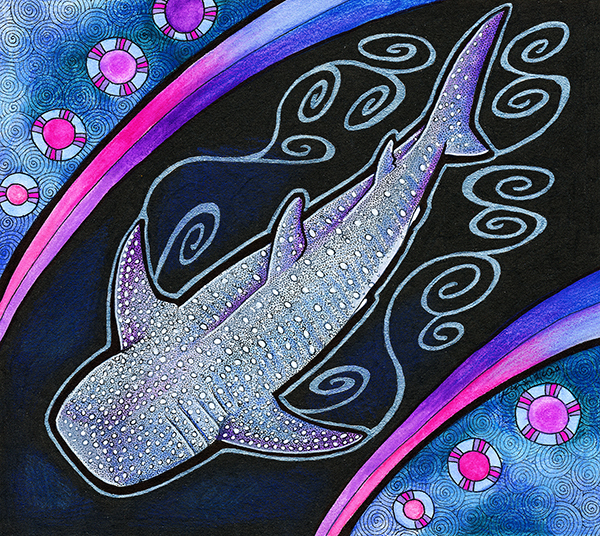Whale Shark – Elusive Answers
Keywords:
A meeting of minds. Mutuality. Curiosity balanced with wariness. Deep thought. Avoid high stress situations. Speculation and philosophy. Elusive answers. Filtering what is useful from what is not. It’s okay that you don’t know. Spiritual grandparent. You are made of star stuff. Gentleness. Gentle warmth. Ocean wisdom.
Description:
The whale shark is the largest fish in the world, and the largest animal in the world after the whale family. It is a slow-moving pelagic carpet shark, that filter feeds like a baleen whale with its large mouth. They are extremely efficient filter feeders with unique filtration pads not found in other filter feeders. They primarily feed on plankton and small fish, as well as clouds of fish eggs, in coastal and oceanic habitats. It prefers tropical oceans. The females are larger than the males, with males averaging 8-9 metres in length, and females around 14.5 metres, though longer and larger whale sharks have been documented.
Whale sharks live between 80 and 130 years. They are marked upon their backs with a variety of white spots and stripes, and these are unique to each whale shark and can be used to help identify them. It’s likely that whale sharks have a significant healing capacity and can recover from significant wounds and regenerate portions of their fins. Whale sharks are migratory, and will seasonally aggregate at well-known coastal sites – such as the Yucatan Coast where over 400 whale sharks have gathered at one time – at varying times of year.
At the time of this writing, no one has observed a whale shark pupping, but mating has been witnessed twice, filmed for the first time in 2019 in Australia. It is thought that whale sharks give birth to live young, and may do so over a prolonged period, instead of giving birth all at once. They are not a threat to humans, being gentle and docile in nature (and playful while young), but conversely, human activity has impacted them, including habitat destruction, oil spill pollution and hunting. Ecotourism is popular, but currently at unsustainable levels.
Was this helpful?
0 / 0